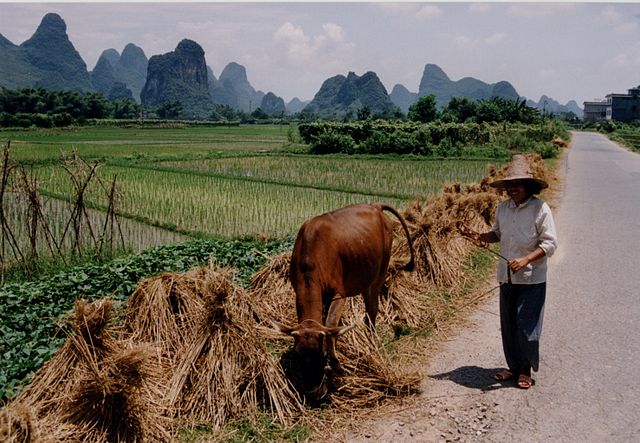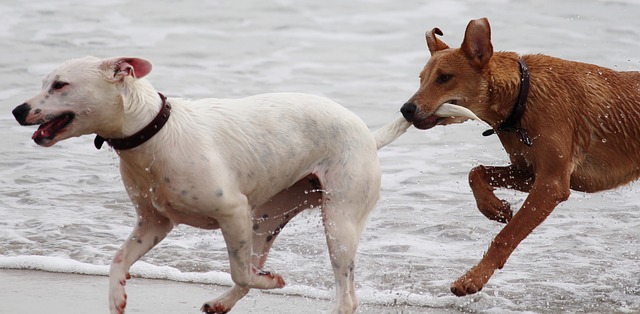Culture and Lifestyle
Barking Mad: The West and the Yulin dog-eating festival

flickr/animalsasia
Food is one of the only things that unites us all. Gathering together on special occasions and preparing ritualistic dishes – the turkey on Christmas, the roast beef on Sunday – is present in nearly all cultures. Yet, in an increasingly connected world not all of these culturally significant feasts are deemed to be appropriate. I’m talking, of course, about the annual dog-eating festival that takes place in Yulin, China. This festival has been garnering a great deal of Western media attention lately. Solely, it seems, for the reason that the idea of eating a dog is severely disturbing to our pet-loving nations. We put puppies on our toilet roll, not our plates.
The Humane Society International, an animal protection organization, has been particularly vocal about trying to get this event shut down. ‘Kidnapped pets, destined for slaughter’ reads an article on their website. However, I was surprised to learn that while the Humane Society does encourage the adoption of a vegetarian diet it does so in very laid back terms. In fact, they call it being a ‘flexitarian’.
No, this doesn’t mean that eating is now replaced by yoga. According to their website being a flexitarian means ‘waking up every day and trying to be more vegetarian’. It promotes things such as ‘meatless Mondays’ and avoiding products like battery-farmed eggs. Eating meat, while not encouraged, is most certainly not condemned. In other words, the chicken you buy from a Western supermarket is no cause for outrage.
Now, it’s not that there is anything wrong with being a ‘flexitarian’ (apart from the terrible name). It’s just, if you compare the Yulin dog-eating festival to our own summer barbecues, the only real difference is what’s on the menu. How can one be so fundamentally wrong and the other completely acceptable? Rationally it makes no sense.
Obviously, to Westerners, eating a pig is hugely different from eating a dog. People eat pork everyday. We have reconciled ourselves with the fact that for us to enjoy bacon sandwiches then we must slaughter pigs, on mass. But when it comes to types of meat we are not morally prepared to consume – say dogs, cats or as the horse meat scandal in the UK proves, horses – then anyone who does not conform to Western dietary habits is condemned as a monster. Even celebrities like Ricky Gervais have stepped in to call for people to help stop the Yulin festival. ‘No animal deserves to be treated like this’ he states on his Facebook page.
And yet, animals are treated like this; and it’s not just dogs. Gervais, to be fair, is an avid animal welfare campaigner and proud vegetarian. He’s perfectly aware of the strange hypocrisy of our society; one that glorifies micro-pigs while having pork chops for dinner. Of the facts circulating the internet the one that seems to be repeated most is the number of dogs killed annually during the festival: 10,000. Which, when compared to other statistics – say the fact that 25,000 piglets are slaughtered every day in Denmark alone – is utterly negligible in terms of the total amount of animal suffering that occurs on our planet. The fact is that we’re being very species specific when it comes to what animal cruelty offends us.
HSI are clearly attempting to promote higher animal-welfare in realistic terms. After all, it’s a nonprofit organization founded in America – the country that consumes the second largest amount of meat per person in the world (second only to Luxembourg). If they started asking all Americans to turn vegetarian immediately they would get nowhere. It would literally be like asking a cowboy to swap his steak for a vegetarian sausage.
But, then again, isn’t that what Westerners are saying to the people Yulin? If India vocally objected to America’s insatiable taste for beef, Bill O’Reilly would openly mock the country on Fox News. And yet, when it comes to eating dog-meat, international organizations are attempting to mediate what the people of the Guangxi region of China should and should not eat. Even if it has been a traditional part of their diet for millennia (that’s not to say all Chinese people condone eating dog, thousands protest against the Yulin festival and others like it).
Any meat-eater who believes the Yulin festival is morally abhorrent should, perhaps, take a look at their own diet before condemning the traditional food of another culture. And, if they truly believe the Yulin festival should be banned then extend that same logic to Western society. Protect animals globally, regardless of species. Ban pig-farms. Ban abattoirs. Ban Nando’s. And anyone who is claiming to disagree with the Yulin festival purely because of the way in which the animals are killed (reportedly being boiled and skinned while still alive) should really educate themselves about the realities of modern farming. Type farrowing crates into Google and you’ll see what I mean.
If Western society really cared about animals we wouldn’t treat the vast majority of them the way we do. We care about dogs, but not pigs. We love cats, but not chickens. Animal rights should be like human rights, extended to everyone regardless of race. Suffering is suffering no matter what genus you belong to.
Culture and Lifestyle
Do you want to surprise a special someone?

Precious and semi-precious stones have been highly valued throughout human history, not only because they are expensive, often symbolising status and luxury, but also because of their great symbolism—many even attribute mystical properties to them. Their indescribable beauty, powerful symbolic value, and economic worth make gifting gems a gesture full of meaning when you want to surprise and delight a loved one. Typically, precious stones are exquisitely set in jewellery—be it a ring, earrings, bracelets, or necklaces—becoming family treasures passed down through generations.
How to choose the perfect gem
The first thing to consider is who the gemstone is for and the occasion on which it will be given. One common occasion for gifting a gem is during a wedding proposal, traditionally in an engagement ring.
It’s essential to consider the recipient’s tastes, whether they love to wear standout pieces or prefer something more discreet. The quality of the gem is crucial, especially if this gift is meant to mark an important moment. For this reason, it should be purchased from reputable places with the best advice—two key aspects that define the store whynotgems, based in Madrid, Spain. Here, they don’t just sell gems commercially; they are passionate about them, putting in supreme effort and dedication, making a significant difference in the industry. The experts at WhyNotGems are constantly travelling around the world to acquire the finest stones, which they then offer to their clients with the most competitive quality-price ratio. They have a versatile online store offering a wide variety of gems, jewellery, and settings to choose from, tailored to individual tastes and preferences.
Another essential aspect to consider when picking a gem is the budget. The price range is very broad, depending on the size, quality, and type of gem. Diamonds, commonly used in engagement rings, are generally the most expensive. Some opt for more affordable but equally beautiful options, such as emeralds, sapphires, topazes, and rubies, which also vary in price depending on their quality and the jewellery in which they are set.
Some characteristics that denote the quality of a stone include its lack of imperfections, vivid colour, and clear transparency. This not only enhances its beauty but also ensures its longevity.
Gems and their meanings
When gifting a stone to a loved one, you’re expressing something. They are more than just a beautiful adornment; they carry significant meaning, so it’s important to understand their symbolism to let the gift speak for itself. For example, diamonds are associated with eternal love, which is why they are the traditional stone for engagements. Sapphires, with their characteristic deep blue, symbolise nobility and loyalty and are often exchanged between friends and family. When you give this gem to a loved one, it conveys that you greatly value your relationship, whether it’s a friendship or family bond. It also signifies a desire to protect the other person during difficult times. Those who love passionately tend to choose rubies, with their characteristic deep red. These gems are typically gifted on wedding anniversaries, as they denote the intensity of a feeling that grows over time.
It’s important to remember that the meanings of stones vary according to individual cultures and beliefs. Some people place more weight on the metaphysical properties of gems, while others are simply enchanted by their aesthetic appeal. Either way, giving a stone will always be a great way to please a loved one on a special occasion.
In conclusion, gifting a gemstone is more than just giving a beautiful piece of jewellery; it’s a timeless gesture filled with deep meaning and thoughtfulness. Whether chosen for its symbolism, aesthetic appeal, or as a treasured keepsake, a gem is a perfect way to express love, appreciation, and commitment to someone special.
Culture and Lifestyle
The visionary Spanish artist makes a milestone in the art industry and human science

The art industry is buzzing with the incredible news of a Spanish artist, Eduardo Vidal, who has achieved an unparalleled milestone in both art and human science. His work can be described as visionary, a term that only few artists are able to live up to. While his works have been featured in some of the world’s most prestigious galleries and museums, Eduardo Vidal art remains humble about his talent.
Eduardo Vidal has developed an original style that blurs the lines between surrealism and minimalism. He uses color theory to create pieces that are both complex yet simple at the same time; he also combines techniques from traditional painting with modern digital technology to create intricate designs. His work is praised for its innovative approach which speaks directly to viewers’ emotions and encourages them to think differently about the world around them.
Art Industry Impact
Art has been a form of expression for centuries, and it continues to be an important part of our culture today. In recent years, the art industry has seen tremendous growth and development as more people turn to art as a means of communication. One artist who is making waves in the industry is Spanish visionary artist Miguel Molinez. He recently achieved a milestone that could have long-term implications not just for the art world, but also for human science.
Molinez’s innovative technique combines the traditional principles of painting with modern digital technology, creating unique works that have captivated audiences around the world. His creative approach to creating artwork has yielded ground-breaking results in both aesthetics and scientific accuracy. His most recent project which involved recreating an ancient historical moment using light was so successful that it could open up new possibilities in terms of exploring our past through visual arts.
Human Science Revolution
The Spanish artist, Carlos Bermejo, has just made a monumental breakthrough in the art and science worlds. His unique approach to incorporating elements of human science into his artwork is revolutionizing the way people think about art. With an emphasis on connecting human emotion and experience with scientific models, he is paving the way for a new era of expressionism.
Bermejo’s latest masterpiece incorporates theoretical physics principles to explore the relationship between time and space. This ambitious project has gained global attention as it bridges both art and science by exploring how humans interact with their environment on an individual level. His work provides a platform for viewers to consider their own place within this world by reflecting on its beauty, mystery, and complexity.
The conclusion of the article regarding Spanish artist’s milestone has been monumental. Spanish visionary artist, Eduardo Vidal, has made a lasting mark on the art industry and human science alike. This new milestone is considered groundbreaking, as it has observed the way humans interact with their environment by utilizing scientific principles and innovative techniques to create meaningful works of art.
Eduardo Vidal success in this field proves that there are no boundaries when it comes to creating meaningful works of art. Through his work, Eduardo Vidal was able to bring together different disciplines such as science and art, highlighting how intricately intertwined they truly are. The impact of his contribution is undeniable; not only has he created incredible works of art, but he also helped bridge the gap between creative fields and opened up new possibilities for exploration in the future.
Culture and Lifestyle
Spend All Your Time Online? Hobbies That’ll Get You More Hands On

If you find yourself always online, it’s best to turn off the computer or phone and find something else to do. However, that’s a lot easier said than done! But if you’ve got a hands-on hobby in your back pocket, you’ll always have something fun and practical to turn to when you get bored.
Staring at a screen all day isn’t healthy for you, and it’s good to find real ways to rest your eyes and get outside a bit more. As such, here are some ideas regarding the kinds of hobbies that’ll help you find enjoyment in things other than what’s going on online.
Woodworking
If you’ve ever fancied yourself as a carpenter, this is the first step on your journey to putting huge items of furniture together for your own home. Get a bit of wood, get a carving knife, and see how you can manipulate the material to make something interesting. Take precautions and protect your hands, but have fun at the same time. And while you’ve not got a woodworking shop yet, even just a small set of tools can help you whittle your way to new cutlery, decorative figurines, and incredibly personal birthday and anniversary presents.
Building Models
Miniatures are a very popular hobby, and all thanks to the time and love we have to put into making them. And when you’re a fan of building your own models, you can move into other item builds, such as attaching 80 lower receiver jigs to a rifle project of your own. But to get started, all you need is a set of models to crack open, snip off, and glue together. Once you’re done with this, you can start painting them and even put together your own playing team. It’s not just a one step hobby you can then display in a cabinet – there’s a lot of nuance to explore.
Gardening and Landscaping
Gardening is a totally free hobby to pick up if you’ve already got a garden. You can take cuttings from bushes, trees, and plants that you see out and about and then try to cultivate the same greenery in your own garden. Indeed, it’s a great way to blow off steam as well as get your hands dirty, which is something a screen just won’t allow! But if you prefer cutting back in the garden, you can try out landscaping instead, which will help you to design the outdoor space you’ve always wanted to relax in.
Bake Your Own Bread
Baking is one of the best hands-on hobbies out there. Why? Because you get to eat something when you’re finished. And baking bread is quite the artform, so you’ll need to really brush up on your skills here. Plus, a freshly baked loaf every morning is always something to look forward to – it’s just the cleaning that’s annoying!
If you’re always online, it’s time to break the habit! Get out and remind yourself there are other things to enjoy.
















